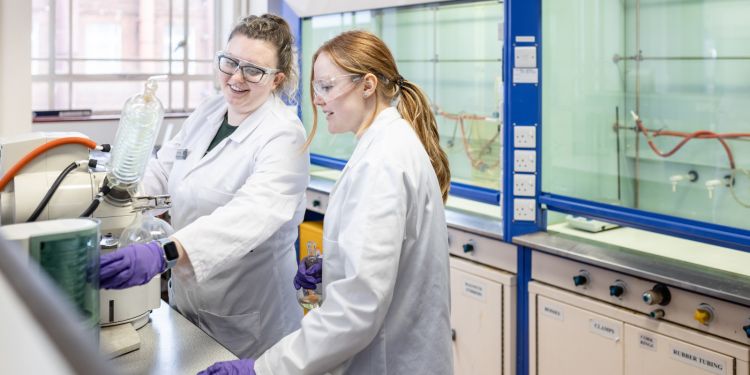Subject pathways within the Natural Sciences degree (2024/25)
Chemistry

If you choose to take chemistry in year 1, you'll cover core aspects of inorganic, organic and physical chemistry relating to molecular structure and reactivity. You'll study topics in bonding and chemical behaviour, covering aspects of the nature of chemical bonds, the influence of electronic structure on molecular shape and physical properties, whilst also considering the energetics of chemical and physical processes, equilibrium processes and the determination of molecular structure. During your first year, you'll have the opportunity to start specialising in the areas of chemistry that interest you most, with options to focus on aspects of synthetic chemistry, reactivity and transformation, or energy and structure.
If you continue to study chemistry in year 2, you'll take core modules including laboratory-based practical work in chemistry, which will provide opportunities to develop your practical skills in synthetic chemistry and/or chemical measurements and analysis. The core modules will also include taught material on analytical chemistry, which will develop your awareness of advanced analytical techniques including mass spectrometry, nuclear magnetic resonance (NMR) spectroscopy, and infrared (IR) spectroscopy, which are essential techniques in modern chemistry.
Depending on your choices in year 1, you'll have options to further your understanding of the nature of chemical bonding and the role of quantum mechanics in modern chemistry, and the interplay between chemical kinetics and thermodynamics in controlling the outcomes of chemical processes. You'll have options to learn about the structure and synthesis of solid-state materials, the preparation and applications of organometallic compounds, the interactions between conformation, configuration and reactivity, and aspects of drug design and pericyclic, heterocyclic and bioorganic chemistry.
In year 3, you'll have a wide range of options within chemistry to allow you to develop your interests. You'll be able to continue your training and experience in practical skills through a specialist laboratory-based module.
You'll be provided with opportunities to expand your knowledge of strategies, methods and reaction technology in organic synthesis, the role of reactive intermediates in chemical synthesis, energy storage within molecules, reaction dynamics, materials chemistry, organometallic chemistry and catalysis. You'll be able to choose options to apply your chemical knowledge to areas including atmospheric chemistry, medicinal chemistry, or to learn about electrochemistry, chromatography, soft matter, laser spectroscopy, computational chemistry, chemical biology, and supramolecular chemistry.
If you’re undertaking the four-year integrated Masters, you’ll take specialist courses from a wide range of options based on current research topics within the School of Chemistry, many of which are interdisciplinary in nature. The range of topics will build on those available to you in year 3 and will be taught by leading experts, providing you with opportunities to learn about the most recent developments at the frontiers of chemical research. You’ll also have the opportunity to do a research-based final-year project in chemistry.

